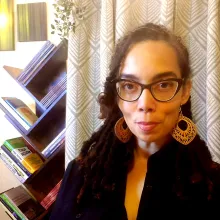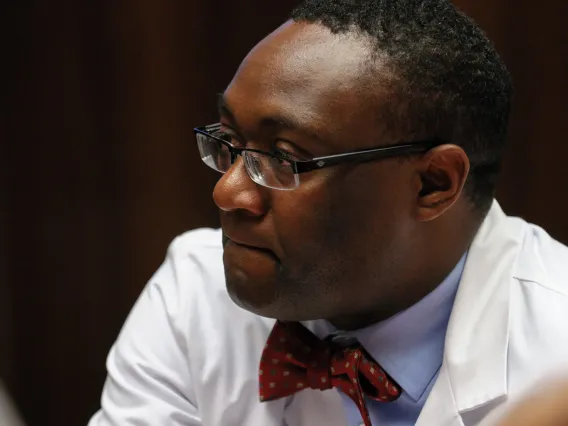
Faces of UA
Real People. Real Scholarship. Real Inspiration.
The University of Arizona is home to many talented scholars, staff members, and students. Get to know the individuals that help our institution excel!
Student Spotlight
Check Out our Past Spotlights!

Dr. Dawn Demps (she/her)
I am a Black African American woman who is the unmarried mother of 3 beautifully talented godlings ranging in ages from 10yrs-19yrs. I also identify as an MS (Multiple Sclerosis) champion who is capriciously abled which seems appropriate given I am also a Gemini. I utilize the moniker “mother-bridge-interrupter-scholar” to capture the features of what I believe I have been gifted and called to do in the world as a natural and othermother, in my home, the global community, and in my intellectual pursuits.
I am a first-generation college student who was born and raised in Flint, MI. I started off high school at Powers Catholic High School in Flint, MI where I received a scholarship which enabled my family to afford for me to attend. While an awesome school academically, its’ racial climate and intolerance instigated my eventual transfer to Flint Central High School. I begged my mother to let me attend Central after I saw their award-winning Madrigal choir perform at a community event. During my high-school years I sang in multiple choirs, acted in stage plays and enjoyed history, civics, English and social studies classes. Still, a culmination of youth decisions, life circumstances and ill-equipped educational institution responses led to me being pushed out of high school at 16. I eventually got my GED at 26 while pregnant with my first child, Journi. Her birth motivated and inspired my academic path, and I attended my first college class at Aurora Community College in Denver, Colorado 3 months after she was born. I then returned home to Flint and attended Mott Community College before transferring to the University of Michigan-Flint where I got my Bachelor of Arts with a double major in Africana Studies and Social Sciences. I went on to Marygrove College in Detroit, MI to earn my master’s in Social Justice Studies. Consistent throughout these years of schooling was my engagement with youth and families, merging my passion for the arts, faith in the possibility of education for marginalized populations and community advocacy. I wrote for and received multiple community grants and served as the director of multiple education access, arts inspired and community advocacy projects.
Due to my desires connected to community uplift, I was not sure if the academy would be the space for me to further these aspirations although I was always attracted to the life of social investigation and the mind. Furthermore, as a Black single mother who is oftentimes physically challenged, I feared the barriers I may inordinately face and questioned the support system the academy would avail me. Yet, I had countless mentors who urged me to pursue my intellectual pursuits and encouraged me to stretch and think in new ways about how the academy could/should be the environment to improve social circumstances for our most vulnerable populations. I applied for and was accepted in 2016 to the Ph.D. program in Education Policy and Evaluation in the Mary Lou Fulton Teachers College at Arizona State University. While at ASU I also worked towards a graduate certificate in African Diasporic Studies in their School of Social Transformation. I completed that portion of my Ph.D. journey in April of 2021 and was fortunate enough to quickly begin my life as a researcher and professor at the University of Arizona the following Fall.
I am currently a professor of Education Leadership and Policy in the Educational Policy Studies and Practice Department in the College of Education. I teach intro and advanced qualitative research courses and a new course on using community power with research to move educational policy change. I am also working with a powerful team led by Dr. Regina Deil-Amen in Education Policy Studies and Practice to initiate a new minor program for Emancipatory Education. Much of my work centers on the history and current iterations of Black educational exclusion and how communal resistance efforts challenge these patterns. I have received past academic funding from the ASU Dissertation Completion Fellowship and the American Association of University Women (AAUW). Most recently I have received financial support from the Smith Endowment Fund to begin a study capturing the experiences of Black K12 DEI school and district leaders in Arizona during the entwined tumult of George Floyd, Covid and the boisterousness of White Supremacy.
I did not begin my academic experience intending nor knowing that this is where I would end up. I battled imposter syndrome and doubts about my true intellectual acumen. I faced the structural violence and lockout that can often greet historically marginalized students on the steps of the ivory tower. I have much I could say to hopeful Black future university students and faculty. Yet for brevity, I will note just a few that I believe to be paramount.
1) Strong support network- This journey is a juggernaut for any individual. If additional complications threaten to impede your progress, a strong team of guidance, encouragement and resources will be key to you making it over and through the trial. In addition to my family, my academic mentors and home community, on campus I have connected with the Black Faculty Association, Sankofa and am building connections with African American Student Affairs (AASA). These homeplaces offer both support and reprieve when things seem immovable.
2) Ask questions and doggedly chase the answers- Due to our inscribed association with stupidity and asking questions, we shy away from speaking up and admitting when we do not know something. This will not serve you well. Asking questions and seeking out the answers will ultimately save you time, effort, and embarrassment in the long run.
3) Reach out to role models, they are only human- I was able to meet and have a part of my academic travails scholars like Dr. Pedro Noguera, Dr. Stanlie James and Dr. David Stovall who I saw exemplify what it means to put theory into praxis and stayed connected with their communities. Some of these connections were facilitated by others in my network, but others occurred because I was not afraid to reach out to those individuals. We are socialized to believe that great thinkers and scholars are untouchable. While their time is indeed limited, they still put on their socks one foot at a time. Take the chance and make contact. You never know what will come forth.
4) Lead with quality and integrity- If you are in fact reaching out to the individuals you admire, you need to be a quality student, scholar and/or advocate who has a track record of integrity and just being a good person. I know the academy can seem competitive, but if people see you as a stand-up person, they are more willing to make time for you. Additionally, you are seeking out precious attention from people who are already pulled wide and in many directions. Lastly, the fact remains, especially as a person of color, that we are required to be 10 times as amazing to get half-time acknowledgement. So, step in with your greatness on shine!
I have not met all the people whom I consider luminaries in academia, though I have been fortunate enough to rub shoulder with many. Of those whom I have yet to meet, in the future I wish to work with Dr. Michelle Fine, Dr. Gloria Ladson Billings, Dr. Joy James and Dr. Michael Dumas. This list is by no means exhaustive.
I know I was not intended to be in this space. But now that I am here, it is my plan to make the most of whatever influence I garner to broaden what being the “college type” means and what the role of the University is in social improvement and justice expansion.
Space



